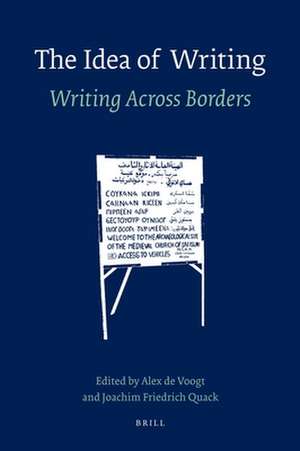The Idea of Writing: Writing Across Borders: The Idea of Writing, cartea 2
Editat de Alex de Voogt, Joachim Friedrich Quacken Limba Engleză Hardback – 8 dec 2011
Preț: 636.95 lei
Preț vechi: 776.77 lei
-18% Nou
Puncte Express: 955
Preț estimativ în valută:
121.89€ • 132.36$ • 102.39£
121.89€ • 132.36$ • 102.39£
Carte indisponibilă temporar
Doresc să fiu notificat când acest titlu va fi disponibil:
Se trimite...
Preluare comenzi: 021 569.72.76
Specificații
ISBN-13: 9789004215450
ISBN-10: 900421545X
Pagini: 256
Dimensiuni: 160 x 240 x 20 mm
Greutate: 0.57 kg
Editura: Brill
Colecția Brill
Seria The Idea of Writing
ISBN-10: 900421545X
Pagini: 256
Dimensiuni: 160 x 240 x 20 mm
Greutate: 0.57 kg
Editura: Brill
Colecția Brill
Seria The Idea of Writing
Cuprins
Acknowledgements
1. Invention and Borrowing in the Development and Dispersal of Writing Systems
Alex de Voogt
2. 27–30–22–26 – How Many Letters Needs an Alphabet? The Case of Semitic
Reinhard G. Lehmann
3. Nubian Grafffijiti Messages and the History of Writing in the Sudanese Nile Basin
Alex de Voogt & Hans-Jörg Döhla
4. About “Short” Names of Letters
Konstantin Pozdniakov
5. Early Adaptations of the Korean Script to Render Foreign Languages
Sven Osterkamp
6. Han’gŭl Reform Movement in the Twentieth Century: Roman Pressure on Korean Writing
Thorsten Traulsen
7. The Character of the Indian Kharoṣṭhī Script and the “Sanskrit Revolution”: A Writing System Between Identity and
Assimilation
Ingo Strauch
8. Symmetry and Asymmetry, Chinese Writing in Japan: The Case of Kojiki (712)
Aldo Tollini
9. Writing Semitic with Cuneiform Script. The Interaction of Sumerian and Akkadian Orthography in the Second Half of
the Third Millennium BC
Theo J.H. Krispijn
10. Old Wine in New Wineskins? How to Write Classical Egyptian Rituals in More Modern Writing Systems
Joachim Quack
Subject Index
Language (Group) and Script Index
Author Index
1. Invention and Borrowing in the Development and Dispersal of Writing Systems
Alex de Voogt
2. 27–30–22–26 – How Many Letters Needs an Alphabet? The Case of Semitic
Reinhard G. Lehmann
3. Nubian Grafffijiti Messages and the History of Writing in the Sudanese Nile Basin
Alex de Voogt & Hans-Jörg Döhla
4. About “Short” Names of Letters
Konstantin Pozdniakov
5. Early Adaptations of the Korean Script to Render Foreign Languages
Sven Osterkamp
6. Han’gŭl Reform Movement in the Twentieth Century: Roman Pressure on Korean Writing
Thorsten Traulsen
7. The Character of the Indian Kharoṣṭhī Script and the “Sanskrit Revolution”: A Writing System Between Identity and
Assimilation
Ingo Strauch
8. Symmetry and Asymmetry, Chinese Writing in Japan: The Case of Kojiki (712)
Aldo Tollini
9. Writing Semitic with Cuneiform Script. The Interaction of Sumerian and Akkadian Orthography in the Second Half of
the Third Millennium BC
Theo J.H. Krispijn
10. Old Wine in New Wineskins? How to Write Classical Egyptian Rituals in More Modern Writing Systems
Joachim Quack
Subject Index
Language (Group) and Script Index
Author Index
Notă biografică
Alex de Voogt, Ph.D. (1995) in Psychology, Leiden University, is an Assistant Curator at the American Museum of Natural History in New York. His studies on writing systems and the dispersal of board games focus on the Indian Ocean region.
Joachim Friedrich Quack, Ph.D. (1993) in Egyptology, University of Tübingen, Habilitation (2003) in Egyptology, Free University of Berlin, is Professor of Egyptology at Heidelberg University. He is a leading specialist for Egyptian cursive writing systems.
Contributors include Hans-Jörg Döhla, Theo Krispijn, Reinhard Lehmann, Sven Osterkamp, Konstantin Pozdniakov, Joachim Friedrich Quack, Ingo Strauch, Aldo Tollini, Thorsten Traulsen and Alex de Voogt.
Joachim Friedrich Quack, Ph.D. (1993) in Egyptology, University of Tübingen, Habilitation (2003) in Egyptology, Free University of Berlin, is Professor of Egyptology at Heidelberg University. He is a leading specialist for Egyptian cursive writing systems.
Contributors include Hans-Jörg Döhla, Theo Krispijn, Reinhard Lehmann, Sven Osterkamp, Konstantin Pozdniakov, Joachim Friedrich Quack, Ingo Strauch, Aldo Tollini, Thorsten Traulsen and Alex de Voogt.

